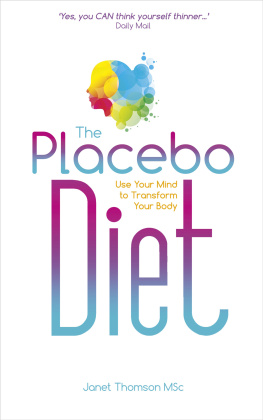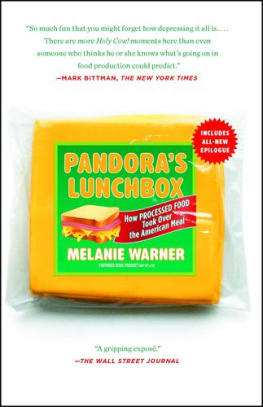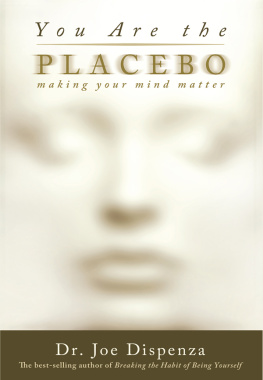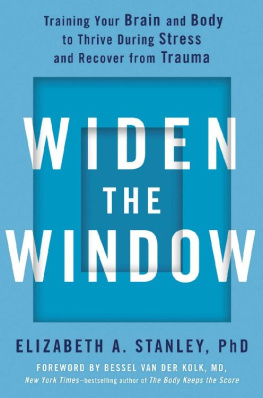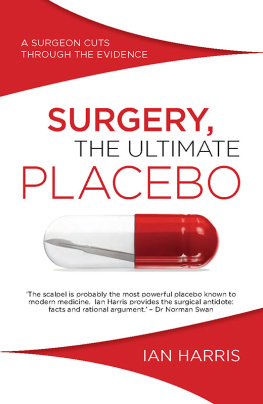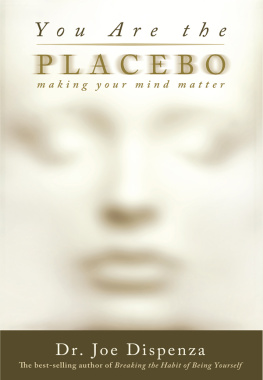THE
PLACEBO
RESPONSE
How You Can Release
The Bodys Inner Pharmacy
for Better Health
HOWARD BRODY
with Daralyn Brody

To Sheila and Mark
and to the many patients
who have taught us
Authors Update2011 Since 2000, much new research has been done on the placebo response. The core messages of this book remain valid, but we know much more about the ways that the brain, body, and surroundings work together to produce these responses. An excellent but technical summary of the new research is Frabrizio Benedetti, Placebo Effects (Oxford University Press, 2009).
INTRODUCTION
The Power of the Mind
This book begins and ends with a mysterya mystery of healing. So it seems appropriate to lead off the introduction with a riddle: What do the following case studies have in common?
Albert consults his physician about a bothersome cold. Because the condition is viral, his doctor knows antibiotics wont help. But Alberta bit of a hypochondriacis sure the cold is turning into pneumonia, although it shows no medical signs of doing so, and he pleads for antibiotics. Considering the distress Albert is displaying, his physician makes a choice and writes him a prescription for what he says is a potent antibiotic. In reality, the antibiotic is a simple sugar pill100 percent medically ineffective. Yet once Albert begins taking the antibiotic, his cold disappears almost overnight.
Beatrice, who strongly believes in herbal remedies, purchases a much touted new organic food supplement at a health food store. After taking it for several weeks, she feels considerably more energizeddespite the lack of any recognized scientific evidence that the supplement can physiologically affect the body.
Charles develops cancer and undergoes the standard surgery and chemotherapy. As he believes strongly in the healing powers of the mind, he also begins practicing meditation, thinking positive thoughts, and forgiving all the people against whom he harbored grudges. He also stops blaming himself for contracting the disease, realizing it was a bad break but hardly his fault. Not only does he feel better and enjoy life more, he also remains in remission after several years.
Danielle has just had surgery to remove her gall bladder. Her hospital room is bright and sunny, with a lovely view of a sweeping, tree-lined lawn, and the nurses are especially kind and attentive. Danielle is up and about and feeling great after only ten dayswhen most gall bladder patients require a recovery period of three to four weeks.
Eugene, who suffers from mild high blood pressure, volunteers to be a subject for an eight-week experiment of a new drug for hypertension with possibly fewer side effects. Eugene is informed that half the subjects will receive the new drug, while the other half will be given an inert placebo; neither the physicians nor the subjects will know which is whichbut, because the people being tested have only mild hypertension, theres little medical risk for the placebo group, especially with a weekly blood pressure check. At the end of the study, when the investigators break the code, Eugene learns he was in the placebo group. Before he was placed on any medication, Eugenes blood pressure was 150/99. During the study, he learns to his amazement, his pressure dropped to 132/88while taking only an inert placebo.
Just what is it that Albert, Beatrice, Charles, Danielle, and Eugene have in common? At first glance, youd probably say, Nothing at all. Some were given various forms of medication by their physician; others did things on their own. Some of them used conventional medicine, while others turned to alternative solutions. Some consciously thought about their conditions; others were influenced by their environment without even being aware of it. So is the answer to our riddle really nothing at all?
Not to me. Id suggest, by contrast, that there is in fact a commonality in all these cases. Its that mysterious phenomenon of the mind working in tandem with the body to enhance healing: the placebo response. What I mean by the phrase is that when a certain set of circumstances are present (what Ill be calling the meaning model), ill persons seem to improve greatly in what at first seems an inexplicable way.
Before we discuss the placebo response further, Id like to tell you a little about myself and how I came to be associated with it. I am a physician, presently Professor of Family Practice and Philosophy at Michigan State University, where I also serve as Director for the Center for Ethics and Humanities in the Life Sciences, while remaining actively involved in the ongoing care of my own patients. Ive also written many papers and several books on various aspects of medicine, but have always given special attention to the placebo response. (My book Placebos and The Philosophy of Medicine was one of the first full-length works on the subject.)
Indeed, my journey as a practitioner includes an early interest in the placebo response as an intellectually challenging puzzle. For many years I have read as much as I could about this fascinating aspect of medicine and began theorizing to make all that I had read about the placebo response hang together coherently.
While I was doing this reading and theorizing, I was also learning to treat patients. First, my teachers in medical school and in residency showed me how to treat patients; finally I was far enough along to let the patients themselves start to teach me how to treat them. At first, I did not see a lot of carryover between my fancy theories and my actual practice. I tried hard to listen to people and to treat them respectfully, and I thought my relationships with patients were an especially important part of my ability to diagnose them and help them heal. But I believed this because thats what I had been taught, and not because of my study of the placebo response.
As the years went by, I found myself noticing that certain ways of approaching patients seemed to elicit from them both a higher level of satisfaction and also a stronger effort on their part to get better. I was excited to realize, over time, that the approaches that worked were exactly those approaches that best fit with my theories. As I read more recent research into the physician-patient relationship, I kept seeing the same themes I had earlier identified as part of my theoretical construction of the placebo response. I was seeing, finally, the convergence of theory and practice. The theory that seemed intellectually to make the most sense of the placebo response also turned out to guide me directly to the practical approaches that seemed to make patients better. And, in turn, when I thought most carefully about what I saw working in my own practiceor what I read about in medical studiesI found myself further expanding and developing my theories.
In The Placebo Response, Ill present what Ive learnedwhich, as Ive said, many more physicians every day are also discoveringin ways that will help you achieve and maintain a heightened level of wellness.
Ill explain that the placebo response occurs when we receive certain types of messages or signals from the environment around us. These messages work in some fashion, at some level, to alter the meaning of our state of health or illness. Perhaps, for example, the old meaning we attributed to our illness was, This is scary, and I dont know whats causing it, while the new meaning is Now I know this is going to get better. Or perhaps the old meaning was, No one cares what happens to me. Now the meaning becomes, People around me seem really concerned about my health.
Next page

